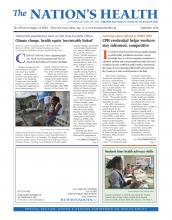Many New England states regularly rank among the healthiest states in the nation. Just last year, Vermont, Massachusetts and Connecticut all ranked in the top five.
But a deeper dive into the data reveals even the healthiest states can be home to big health disparities.
“We know we have persistent and pervasive disparities,” said Rodrigo Monterrey, MPA, deputy director of the Massachusetts Department of Public Health’s Office of Health Equity and co-chair of the New England Regional Health Equity Council. “But we felt that just stating that was not enough — we needed to document it.”
Monterrey is referring to a 2016 report from the council — “New England Regional Health Equity Profile and Call to Action” — that identified significant disparities across New England in both health outcomes and access to care.
But what made the report a first-of-its-kind was that it took a health equity approach, drilling down to identify differences in social determinants and opportunity that underlie disparities in poor health and disease burden.
Charles Drum, PhD, MD, MPA, lead author of the report and co-chair of the council’s Data, Research and Evaluation Committee, said the report is also unique for its inclusion of disability.
“Given limited resources for state and local health departments, the report provides New England states with comparisons to their geographic neighbors, examples of programs that can be replicated and calls for more regional partnerships,” Drum, a visiting scholar at the American Association on Health and Disability, told The Nation’s Health. “Equally important from my perspective, the report reveals the compounding disparity effect of the presence of disability.”
The report, which council members disseminated in their home communities and that continues to guide regional equity work, found that racial and ethnic minorities and people with disabilities are twice — and in some cases, up to three times — more likely than whites and those without disabilities to delay needed care due to cost.
Among the report’s other findings: Poeple with disabilities experience higher rates of stroke, cancer and diabetes; significantly larger percentages of black, Hispanic and American Indian and Alaska Native households live on less than $25,000 a year; and considerably higher percentages of black, Hispanic, American Indian and Alaska Native and adults with disabilities did not graduate high school.
The report and call to action are based on data from the Behavioral Risk Factor Surveillance System and provides regional and state-based data for Connecticut, Maine, Massachusetts, New Hampshire, Rhode Island and Vermont.
Monterrey said the council hopes the report’s insights will continue shifting from a lens of disparities to one of equity.
“A lot of time, we think we’re talking about health equity, when in reality, we’re only presenting disparities data,” he told The Nation’s Health. “And if we base our responses only on disparities data as opposed to providing that data in the context of health equity, our responses won’t be as effective.”
The regional council’s next report will focus on mental health and addiction among minority youth and youth with disabilities. For more information or a copy of the 2016 report, visit http://region1.npa-rhec.org.
- Copyright The Nation’s Health, American Public Health Association









